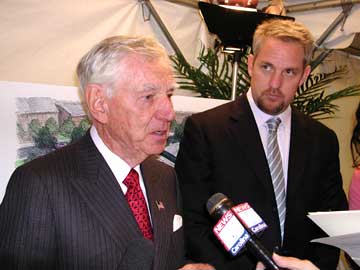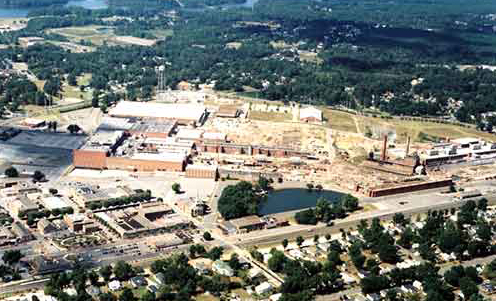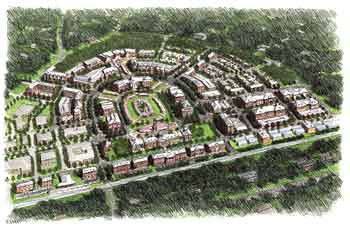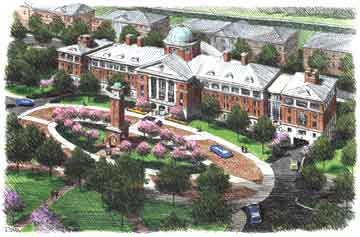avid H. Murdock believes nutrition, tweaked by top scientists, may one day help cure humankind’s dreaded diseases. The California billionaire believes so much in the concept’s potential he is putting the financial nutrients into a billion-dollar gambit to create what he calls an unrivaled biotechnology research campus in North Carolina. In doing so, Murdock is leading an effort that figures
 |
| David H. Murdock Sr., chairman, CEO and owner of Dole Foods, (left) and Dr. Andrew Conrad, Dole Foods’ chief scientific officer, discuss the North Carolina Research Campus in Kannapolis. |
to put considerable momentum behind the state’s segue from old-line manufacturing to high technology.
Webster likely never heard of “biopolis,” but that description of North Carolina’s latest biotechnology project may be soon finding its way into dictionaries. At the very least, it may become synonymous with the economic revival of Kannapolis, one of the state’s venerable but hard-hit textile towns.
For Murdock, a ninth-grade dropout who became one of America’s wealthiest men, making his fortune in real estate, it’s a return to the scene of his three-year ownership of what was once the world’s leading towel manufacturer, Cannon Mills. Two years ago, Pillowtex, Cannon’s successor, saddled with huge debt and facing an onslaught of imported textiles, went belly up, laying off more than 4,000. Now, Murdock’s biopolis is a chance to transform the small city of 40,000, about 30 miles (48 km.) north of Charlotte.
Murdock, 82, chairman, CEO and sole owner of Dole Food Co. and real estate firm Castle & Cooke, envisions a 350-acre (142-hectare) research campus that may one day create 35,000 jobs. The campus will focus on nutrition research, a favorite subject of Murdock’s. The project’s research university partners are using “biopolis” to refer to the new campus and that suits Murdock just fine.
“I like the term ‘biopolis’ very much,” Murdock tells Site Selection. “The dictionary might say there isn’t such a word, but it’s a new term that will be used extensively about our town. I want to make this entire town into a think tank.”
Murdock’s project will essentially rebuild downtown Kannapolis. His biopolis will include a new town hall as well as retail and residential development. When completed in five years, the campus will feature more than 1 million sq. ft. (93,000 sq. m.) of office and laboratory space, 350,000 sq. ft. (32,500 sq. m.) of new retail and commercial space and approximately 700 new residential units. Working within its confines will be 5,000 scientists and associates and up to 30,000 other auxiliary personnel, developers say.
Construction on the massive undertaking will begin in December. Demolition began in August on the sprawling 5.8-million-sq.-ft. (539,000-sq.-m.) former textile complex that is almost as large as the Pentagon. On the footprint of where textile workers made towels and sheets for more than 100 years, researchers will try to unlock the mysteries of cancer, diabetes and other diseases by studying nutrition.
 |
|
| The North Carolina Research Campus will cover 350 acres (142 hectares) in downtown Kannapolis on the site of the former Pillowtex textile complex. The project involves the state’s major research universities and will house 100 to 200 startup biotech companies. |  |
Murdock will be investing his own money into the project, which will not be receiving any of the state’s major economic development incentives. North Carolina’s business climate is second to none, says the man that Forbes ranks as the 52nd wealthiest person in America with a fortune estimated at $4 billion. That lofty opinion has led Murdock to also site two major food processing facilities in North Carolina: a $54-million vegetable processing plant in Gaston County and a soon-to-be announced frozen food facility of similar investment value.
“I’ve worked in most of the states and I build all over the country, but I’ve never found any state as cooperative as the state of North Carolina,” Murdock says. “That’s why we will be spending a billion dollars there over the next several years as we build a new town. People have been enormously helpful there at all levels. Local politicians, federal officials, the state House, the state Senate have been incredibly helpful. Sen. [Marc] Basnight and [House] Speaker [Jim] Black have been incredibly helpful and have given more time and more thought and have done more to get me to locate and move two of my companies to North Carolina.”
The North Carolina Research Campus is the project’s official name and it figures to keep North Carolina standing tall in the biotechnology field. The state already ranks third in the nation in biotech behind California and Massachusetts in the latest Ernst & Young industry survey. The Milken Institute pegs the state’s Raleigh-Durham biotech cluster as No. 1 in the country.
The Kannapolis venture currently involves three of the state’s major research universities — North Carolina State University, the University of North Carolina at Chapel Hill and the University of North Carolina at Charlotte — with others likely to join later. Discussions are ongoing to include involvement from Duke University and other universities and colleges around the state. Here’s what each current partner will contribute:
North Carolina State University and Dole Foods will develop the Dole-N.C. State Institute for Advanced Fruit and Vegetable Science with the goals of improving the nutritional content of fruits and vegetables, enhancing human health and increasing agricultural production. The N.C. state facilities will include 50,000 sq. ft. (4,600 sq. m.) of research space and 100,000 sq. ft. (9,300 sq. m.) of experimental and research-oriented greenhouse facilities.
UNC-Chapel Hill will establish the 120,000-sq.-ft. (11,150-sq.-m.) UNC Institute for Excellence in Nutrition, which will focus on research examining the relationship between nutrition and the brain, obesity and cancer.
Murdock says the Kannapolis project’s “most exciting” component will be a privately operated high school for girls: “We will be searching the country for the most gifted young ladies in math and science,” Murdock told the crowd during the project’s festive announcement in Kannapolis in September. The University of North Carolina at Charlotte will develop the preliminary design and academic plan for the girl’s high school and will eventually participate in the bioinformatics aspect of nutritional research.
Molly Broad, president of the 16-campus University of North Carolina System, says the collaboration between the universities and Murdock is the product of many brainstorming sessions.
“This is a collective effort of monumental proportions,” Broad said during the project’s announcement. “It gives new meaning to the terms collaborative and multi-disciplinary. It underscores our commitment to foster statewide economic development and technology transfer. This project will serve as a national model for what can happen when private enterprise, higher education and state government partner to affect positive change for the future.”
 |
| The Core Lab at the North Carolina Research Campus will be the most advanced facility of its kind in the world, say project developers. It will be the first building constructed during the five-year biopolis project. |
Participation by the state university system hinges on funding approval. Basnight, Black and other state lawmakers plan to seek funding during the next session of the N.C. General Assembly.
Displaced textile workers, such as the former Pillowtex employees, figure to eventually benefit from the North Carolina Community College System’s planned 40,000-sq.-ft. (3,700-sq.-m.) facility on the campus that will focus on education and training for biotech jobs presumably to be created by the startup companies that incubate on the campus.
Murdock envisions making the campus home to more than 100 startup biotech companies. Several have already signed leases and are anxious to get started, he says. To help them along, Murdock will be contributing $100 million to a venture fund. Also, Burlington, N.C.-based Laboratory Corporation of America, a pioneer in genomic testing, plans to place a facility on the campus.
Murdock’s first foray into Kannapolis was brief, but memorable for shaking things up. He bought family-owned Cannon Mills in 1982, invested heavily in modern machinery and then sold it to Fieldcrest Mills in 1985. However, he maintained a fondness for the city. He kept the company’s 12-bedroom lodge, owns the local country club and has visited Kannapolis often over the last 20 years, monitoring the fortunes and misfortunes of Fieldcrest Cannon and Pillowtex. Murdock says redeveloping the defunct textile mill’s property gives him great satisfaction.
“When you have been part of something, you feel very badly to see its demise,” he says. “When Pillowtex went bankrupt, I wondered what I could do. I have a home there. I own the downtown that exists now. I love the people and the atmosphere very much. Even I must say what we are doing there now is pretty spectacular. There’s not anybody doing anything like what we are doing anywhere in the world. This is not something that I’ve just popped up and said I’m going to do. I’ve thought about doing something like this for many years.”
The first building of the five-year project will house the Core Laboratory facility, a contract manufacturing biogenic facility, and the Dole Research Institute. The Core Laboratory, which will contain a DNA sequencing facility, micro-array facilities, mass spectrometry facilities and other analytical tools, will be available for use by all companies located on the campus.
The contract manufacturing facility will include 30,000 sq. ft. (2,800 sq. m.) of sterile environment and will provide a place where small to medium sized technology companies can produce single runs of biological products in a good manufacturing practice (GMP) facility.
The Dole Research Institute will focus on scientific research relating to nutrition and fruits and vegetables. It will collaborate with both UNC-Chapel Hill and N.C. State University on research findings related to nutrition and the development of new varieties of fruits and vegetables.
“The Core Lab will be stunning and will be unrivaled in the world,” says Dr. Andrew Conrad, Dole’s chief scientific officer and also chief scientific officer of LabCorp’s National Genetics Institute. “I know that sounds boastful, but it’s true.”
The 35,000 jobs estimate is based on an economic formula that uses a multiplier of seven for the 5,000 scientists and associates who will work on the campus, Murdock says. But the project could create jobs beyond the downtown campus as fledgling biotech companies move to the manufacturing stage in subsequent years. Mike Legg, Kannapolis city manager, says city and county economic developers will be looking for sites for potential future development of business parks.
Murdock, who describes himself as a “fish-vegetarian,” has had a long-time interest in nutrition and food research. He’s been head of Dole Foods since 1985.
 |
| Dole Foods will build two plants in North Carolina that will work closely with the North Carolina Research Campus. The first, rendered above, will process vegetables in Gaston County. The second plant will process frozen foods. |
He took the company private and owns 100 percent of it as well as 100 percent of his real estate arm, Castle & Cooke, which will be doing the construction in Kannapolis.
“I’ve been interested in nutrition for many years,” Murdock says. “I do not eat saturated fats, cheese or butter or anything like that. Those are elements that cause cancer, diabetes, heart attacks and many other illnesses.”
So, when Murdock bought the Pillowtex property at auction in late 2003 and the redevelopment brainstorming began, it was natural that nutrition would be part of the plan. Both of the planned North Carolina Dole plants will be working closely with the research campus.
“Obviously biotechnology fits in with Dole Foods,” Murdock says. “We have our own labs and we’re studying everything. We know, for instance, that the body needs approximately 145 food elements. Gee, we grow the majority of those — and I’m arranging for us to grow all of the ones we aren’t growing. Biotech is where that all comes from. I have 59 scientists at Dole working full time for me and I will be hiring many more. We will be studying how to put more nutritional benefits into the products we are currently growing. We believe we can help change the way the world thinks and the way the world eats.”
The Gaston County plant, which promises to create 525 jobs within three years and a total of 900 by 2016, will receive a $500,000 incentive from the state’s One North Carolina Fund. The plant will take fresh vegetables and process them into bagged products for distribution in the southern and eastern U.S.
Murdock says he and Lynne Scott Safrit, who heads his Kannapolis real estate operations, have been inundated with calls from biotech interests all over the U.S. since the project’s official announcement on Sept. 12.
The initial plan, which called for 100 biotech startup companies, may grow to include up to 200, he says, adding that the project has the land and resources to grow beyond its initial scope. However, Murdock says the biopolis will be designed for very specific research.
“We’re getting extensive interest from all sorts of companies,” Murdock says. “We will be looking very closely at technologies to see if they are candidates. We’re going to be very stringent and careful that we bring together the right group. This will be the greatest scientific study group in one spot in the world.”
Murdock is approaching his biopolis with a sense of urgency. Serious discussions on its scope began in February 2005 and there’s been no slowing down.
“First of all, my philosophy is that two hours is time enough and two days is forever,” Murdock says. “You better believe I start everything that way and I have all my life. This operation has one individual calling most of the shots and you’re talking to him. We don’t have to run around and ask anybody for anything. We are getting great help from legislators and they’re putting up money for their institutions.”
Murdock says the only incentives his team has asked for involve cleaning up the Pillowtex site. The project may receive some state brownfield funds and federal clean-up grants.
“But that’s small-potatoes money,” Murdock says. “We’re building all the buildings ourselves.”
The entire campus will be built in the classic regency style with plenty of bricks, Murdock says, noting that he owns several brick manufacturers.
“I’m trying to make it have a good European feel,” Murdock says. “It’s completely organized. I’m very much a man for organization. Downtown will be completely organized, thought out and well laid out.
This is one of very few places that has the opportunity to do this,” he continues. “With most biotech labs, you have some buildings over here and some five miles over there. Here, we have everything within the confines of 350 acres.”

